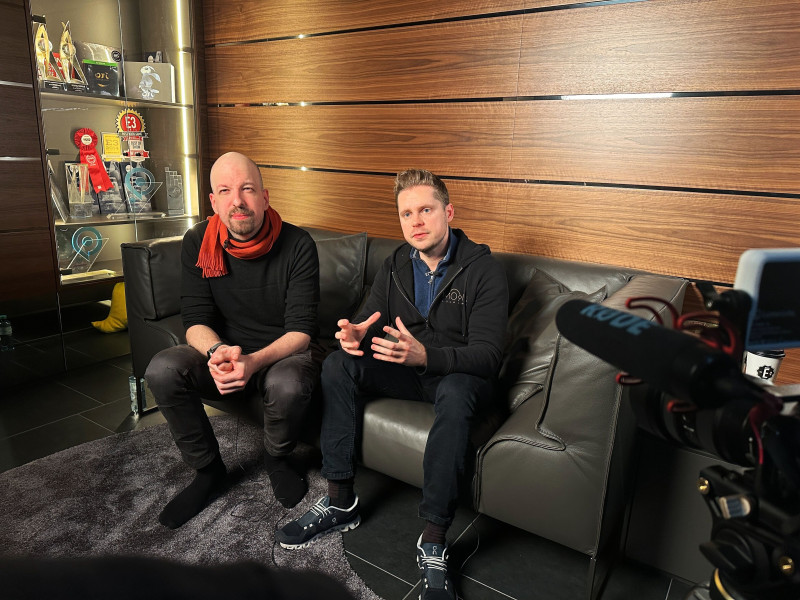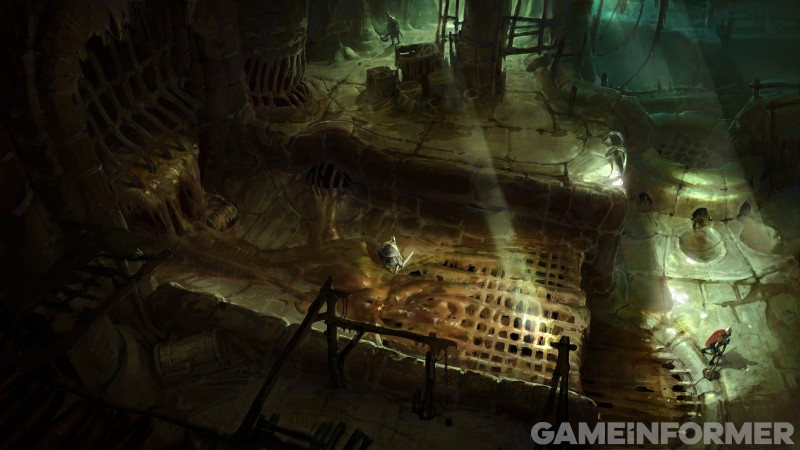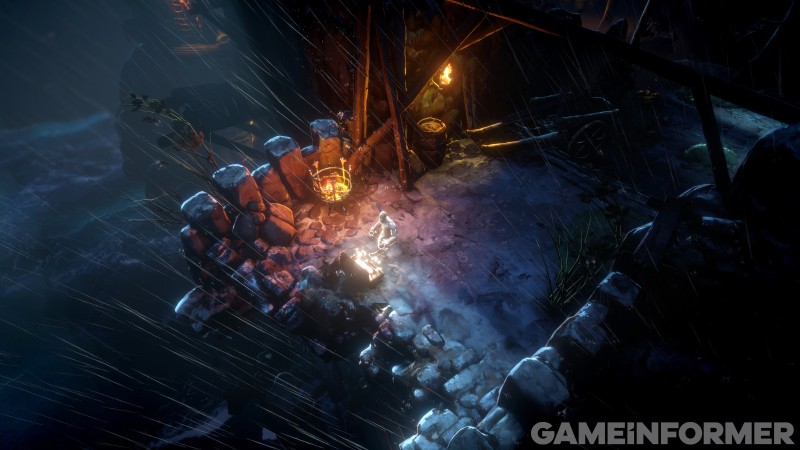No Rest for the Wicked is the upcoming action RPG from Moon Studios, the developer behind Ori and the Blind Forest/Will of the Wisps. It’s also the game gracing the latest cover of Game Informer. Cover story writer and editor Marcus Stewart and I traveled to Vienna, Austria, to play the game and speak with two of its leads, tech and production director and studio co-founder Gennadiy Korol and studio CEO and creative director Thomas Mahler.
However, while the frosted glass of the front door of the two-story apartment we entered was engraved with the words “Moon Studios”, this studio is actually just Mahler’s workplace. Korol met us in Vienna for the cover story, but he actually lives in Israel. The rest of Moon Studios lives around the world, because Moon Studios is completely remote – there is no headquarters to report to or central location to work.

Mahler (left) and Korol (right) explain why Moon Studios is a remote studio
While remote development has become more popular as a result of the COVID-19 pandemic, Moon Studios has been remote since its founding in 2009. When I asked Korol and Mahler about remote development, it’s clear it’s a big part of the team’s winning game development formula, responsible for the aforementioned Ori games and the upcoming No Rest for the Wicked, which launches into Early Access on PC next month.
“We absolutely 100 percent believe it allows us to hire the best talent,” Mahler tells me. “I think for us, it was a little bit easier because we never knew anything else. We started as a remote studio. I do think it’s much harder if you’re at an established studio and you have established, proven processes that are all based on being in the office, and then now, suddenly, the world stops and you have to work remote but these processes […] you’re reliant on […] you have to be in the office for.
“I think that’s a really difficult change to make. That’s like changing the DNA of a studio, but we never had to do that.”
Mahler says he wouldn’t be in game development if not for the internet and, subsequently, remote work. He lives in Austria, and “there’s almost no [games industry] here.” But because of remote work, he was able to work at studios around the world. “I think that’s just amazing, right? That you can find all these people who are just amazingly talented, no matter where they live in the world, and if they’re super hungry, if they’re really passionate, if they’re willing to throw themselves in, then they can get a job in the games industry.”
He says studios that believe you have to work in the office for good work simply haven’t adapted yet. He hopes Moon Studios’ resume of games speaks to the idea that great products can come from remote studios. “I get this question a lot: ‘How did you make it look so coherent?’,” he says. “The workflow is exactly the same: people play the project, they play the build, they’re in touch with one another all the time. I don’t necessarily know why we need to sit in an open office space to achieve that.”

Korol, who attributes their belief in remote work to meeting Mahler on an online forum in 2004 before creating Moon Studios together in 2009, agrees.
“Some people blame certain things that don’t go right when people are working remotely on the fact that it’s remote work,” he says. “But I think it has to be a bit more nuanced. If you’re just trying to force a remote culture on top of the office approach, which is how a lot of these companies are structured, it’s not going to work. You have to kind of re-envision how the communication works, how the documentation works, how the work flow works, and what the big focus point is. I personally believe that remote work actually puts the emphasis on the product and the work even more than office work.”
Korol admits the team does miss out on the opportunity for water cooler moments, which he says can be fantastic moments, but Moon Studios does try to replicate them with streams, meet-ups, and more.
Korol points to a lack of commute, giving employees back more of their time, and the ability to be with family more easily as key factors for Moon Studios’ remote success.

“There’s no commute, so you don’t have to worry about wasting time,” he tells me. “Especially with people with families. We find it works really well for them because they can be with their kids. We’ve heard all these stories of people that say, ‘Oh, I had to ship this game, and I didn’t see my kid growing up, and I missed that precious period where I will never have that again, and my kid will never be that age again and it’s gone, and I was just so busy with work.’ But if you work remotely from home, you can still be there for your family and do great work.
“You can pace yourself much better, and you can take care of your mental health much better, so I’m a huge believer in [remote work.]”
Ultimately, Korol and Mahler, Moon Studios’ two leads, believe remote work is the most efficient process. Studios that aren’t remote are missing out on great talent for their games, they say.
“We believe it’s really ultimately the most efficient process if you do it right, if you hire for that, if you optimize all communication for that,” Korol adds. “And like with everything else, you also have to iterate. So if things go wrong, your first reaction shouldn’t be, ‘Oh, let’s bring everybody back to the office.’ The reaction should be, ‘Well, why isn’t it working? Can we fine-tune it? Can we tinker with it a little bit more?’ And I feel like maybe some people are jumping the gun a little bit too fast and are missing out on some opportunities with great talent.”
No Rest for the Wicked hits Early Access on PC next month on April 18.
While waiting for its launch, check out this feature breaking down the Early Access roadmap and endgame content of No Rest for the Wicked, and then check out more than 25 minutes of the game in our No Rest for the Wicked New Gameplay Today.
You can learn even more about No Rest for the Wicked by checking out our features and videos rolling out over the coming weeks in our exclusive coverage hub below.




